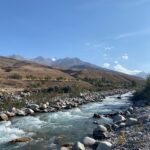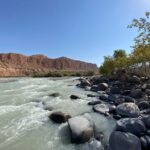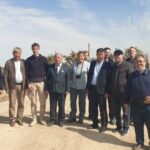Starting the first stage of the Hydro4U project
Promoting and upscaling the implementation of the sustainable small-scale hydropower (SHP) technologies in Central Asia through the large-scale Hydro4U project activities are in full action. To reach the project’s first major stage, a project team consisting of part of the Hydro4U consortium undertook a trip to Central Asia visiting Kyrgyzstan, Kazakhstan and Uzbekistan from 22nd of September to 3rd of October 2021. The project team’s focus lay on the identification and assessment of several potential demonstration and planning sites where our innovative small hydropower planning tools and equipment could be implemented within the upcoming project tasks.
In Kyrgyzstan, the project team met with potential investors and stakeholders, such as the Ministry of Energy, to discuss the planned activities and expected outputs within the Hydro4U project. Synergies were created by active participation in KSTU´s Summer School with lectures on “Sustainable Hydropower” by Dr. Markus Reisenbüchler, Technische Universität München, “Advancing Water-Energy-Food Nexus concept: Examples from Central Asia” by Oyture Anarbekov (IWMI-CA), International Water Management Institute (IWMI), and on “Central Asian hydrology” by Tobias Siegfried, hydrosolutions.ch.
In Uzbekistan, the Hydro4U project team visited further small hydropower sites organised by Uzbekgidroenergo and met with the European Delegation´s programme manager to discuss the proceedings and potential synergies with further EU activities in the region. The discussions presented valuable insights into the multifaceted regional peculiarities from a political, economic, environmental, technical and social point of view. The southern part of Kazakhstan marked the final destination of the Hydro4U project team’s visit to Central Asia. Here, the team faced highly complex man-made hydrological-hydraulic arrangements with vast potential for optimisation applying the Water-Energy-Food-Climate Nexus approach.
The thorough analysis and evaluation of the identified sites is one of the most important initial steps of the project as it is the main prerequisite for the successful project implementation. The team returned very satisfied with several feasible options for the implementation of the upcoming tasks, that now need to be evaluated and prioritised.
The regional partners and stakeholders gave the team a very warm welcome and were enthusiastic and open for future collaboration based on innovative and sustainable approaches for the benefit of all.
Author: Oyture Anarbekov, International Water Management Institute IWMI
photo credits: Bertalan Alapfy, Technische Universität München



